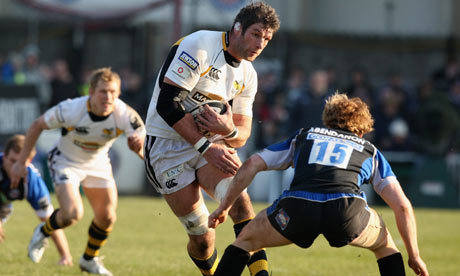
This is a strange feeling. We are barely into April and Wasps have no silverware to play for. After six seasons of winning something, we handed back our Premiership title at Bath on Wednesday night. European qualification is still to play for but the probability is that it will be the Challenge Cup rather than the Heineken Cup for us next season.
That means Toulon rather than Toulouse, Connacht rather than Munster or Leinster. For a side that has won the Heineken twice and started the season ranked among Europe's top six clubs, that hurts and over the next few weeks we'll try to work out what to do about it and why it happened.
Why were we a better side results-wise when our internationals were away? Without them we averaged three points a game. Why did we score 60-plus tries last season and only 20-plus so far this?
Closer analysis will no doubt throw up other issues but it has long been blindingly obvious that one of the major reasons for our discomfort is that we started the season poorly and were nowhere near the pace of the Baths and Harlequins when it came to the delights of the ELVs or rather the ways in which they would be refereed.
We tried to go into the season with a positive mind-set regarding the experimental laws but were pulled up short and forced to change direction when it became obvious how severely the breakdown would be controlled.
The next step was to discover that our kicking and catching game was not up to scratch. When these sort of things start to happen, other doubts creep in and eat away at the foundations.
Historically Wasps are a mauling and driving side. Think Trevor Leota, Craig Dowd, Phil Vickery, Lawrence Dallaglio, Raphaël Ibañez. The drive, the mini-maul and then the Ibañez break-out was trademark stuff that suddenly became redundant last August.
If you want to understand the difference laws can make to the fundamental core of the game, even the shape of its players, just look at the example of Simon Shaw and how he has changed since his early days with Bristol. Then England had a 6ft 10in lineout presence in Martin Bayfield and a 22-stone lock was an equal asset until lifting in the lineout arrived. Simon slimmed down to fly higher and at 19 stone-plus became a world-class mauler.
He still is but, had the experimental law regarding the pulling down of the maul not been reversed this week, sides like Wasps might have been looking for something more mobile if less strong – in fact, something a little under 17-stone and about 6ft 4in, who could play second row, back row or No8. Might we have seen Jordan Crane of Leicester or possibly James Haskell of Wasps as candidates for a move into the second row as one-size-fits-all became rugby's order of the day?
Not any more. And thanks are due to Kevin Bowring and Chris Cuthbertson of the RFU for helping the world see sense this week before, hopefully, going on to restore one of rugby's basic tenets and strengths – that at all levels it is a game for all shapes and sizes. Mind you, quite how the IRB thought that banning the rolling maul and introducing a numerical free-for-all in the lineout would promote its stated intention of a more open game just defeats me. Guys like my boss at Wasps, Ian McGeechan, and other senior coaches with current international experience, suggested from the start that this was seriously flawed thinkingas was the "sanctions" experiment which we avoided, but which led to the blight of free-kicks in the southern hemisphere.
I still have niggling doubts about the retained experimental law that creates an extra 10 yards of space at the scrum – even a defence coach has to admit that the best players can always find their way through the most congested and suffocating blitz – but I'm prepared to trade back what we have got for what we have given up as we reflect on how Wasps prepare for 2009-10.
This might be the end of an era or it could just be a blip. The last time we felt this low it presaged six years in which we won four league championships, two Heineken Cups and the Anglo-Welsh title. You have to be positive.

